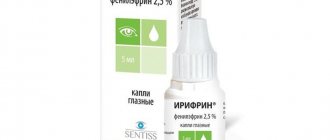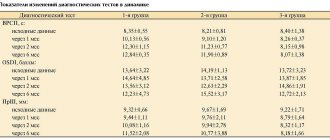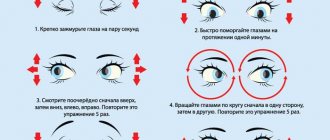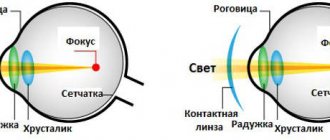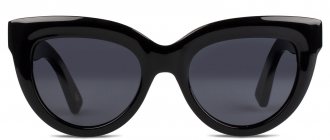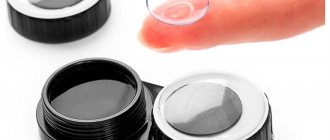Human health largely depends on whether the body has enough certain vitamins and microelements. This also applies to vision. There are vitamins and microelements that have a positive effect on the condition of the eyes. With an unbalanced diet, the body may lack certain nutrients, and in this case, vision problems arise.
Sign up for a free vision test
However, it should be understood that vision vitamins cannot “cure” myopia, farsightedness or astigmatism. These disorders are associated with the irregular shape of the eyeball and the characteristics of the refractive media of the eye, and this cannot be corrected by taking any vitamins or dietary supplements (dietary supplements). However, it is worth taking vitamins if you are tormented by the following questions:
- how to normalize eye function;
- how to slow down age-related changes in the retina;
- how to ensure nutrition of the retina in the presence of retinal dystrophy, which can occur with a high degree of myopia.
Most vitamins are not synthesized in the body. This means that nutrients must come from outside, with food. But, firstly, a person may not eat certain foods simply because he doesn’t like them.
Secondly, there are seasonal products that periodically disappear from store shelves or become significantly more expensive, while the eyes need vitamins all year round. That is why it is recommended to use various vitamin complexes and dietary supplements that replenish the lack of substances that the body needs. But in order to avoid possible problems, before starting the course you should definitely consult a specialist.
!
Plant extracts
Blueberry extract
Blueberries, a plant whose fruits and leaves are rich in natural anthocyanins, which are compounds of anthocyanins and glycosides.
Anthocyanins are substances that can strengthen vision due to their pronounced antioxidant and vasoprotective effects. The main active components of blueberry extract are anthocyanins, since anthocyanin glycosides cannot penetrate the cell membrane. They have the following effect:
- prevent damage to eye tissue by free radicals (antioxidant effect);
- reduce the fragility of capillaries, strengthen vascular walls, increasing their elasticity;
- increase the flexibility of cell membranes, contribute to the stabilization of phospholipids of endothelial cells, and prevent platelet aggregation;
- stimulate metabolic processes at the tissue level;
- activate blood supply to the eyes, improving microcirculation and stimulating blood flow to the retinal area, which is very important for diabetic microangiopathy;
- reduce the risk of developing age-related macular degeneration and glaucoma;
- suppress the activity of aldose reductase, which reduces the formation of sorbitol in the lens tissue and prevents the development of cataracts;
- improve the enzymatic activity of the retina, accelerate the restoration of the light-sensitive pigment - rhodopsin and increase its sensitivity to light intensity: increase visual acuity in low light conditions, at dusk (night blindness, night blindness), improve adaptation to intense light.
- replenish rhodopsin reserves
For older people: drops with and without lutein
As many people age, they face the risk of developing cataracts. To protect yourself, you need to select effective preventive medications prescribed by doctors.
For older people, doctors recommend special eye medications with lutein, which will slow down the decline in visual acuity and the development of cataracts, glaucoma and farsightedness.
But these diseases occur with age-related changes.
• Vitafacol
Vitafacol Forte for eye drops is non-addictive, has restorative and antibacterial properties, and provides comprehensive care to prevent cataracts.
• Cromohexal
Drops for the prevention of age-related dystrophy of the cornea and retina. The product prevents vision loss.
Vitamins
Vitamin A (retinol)
This vitamin is a direct participant in visual processes. In the form of cis-retinal, vitamin A forms the visual pigment rhodopsin, synthesizing the formation of visual purple with each light excitation. This process is of great importance for people who work a lot in front of computer screens or spend time watching TV screens. In this case, the eyes have to react every second to light contrast stimuli. With each such irritation, a huge number of rhodopsin molecules disintegrate with the instant creation of new ones, due to the biosynthesis of vitamin A and protein. If there is not enough vitamin A, the amount of rhodopsin synthesized is sharply reduced and inevitable visual impairment occurs.
A lack of vitamin A causes the destruction of one of the types of photoreceptors - rods, and twilight vision is impaired. Its earliest sign is dysfunction of the retinal rods. Then dryness of the conjunctiva occurs, a decrease in the secretory function of the lacrimal glands, the conjunctiva thickens, Bitot's plaques appear, clouding of the cornea occurs, corneal hyposthesia occurs, photophobia develops, etc. The result of hypovitaminosis And the process can be perforation of the cornea and panophthalmitis.
However, excessive intake of vitamin A (hypervitaminosis) can lead to serious toxic disorders. Therefore, it is better to partially replace vitamin A intake with beta-carotene, which is considered provitamin A and is synthesized into vitamin A only in quantities required by the body. Unlike excess vitamin A, excess beta-carotene does not cause dangerous side effects.
Vitamin C (ascorbic acid)
Vitamin C or ascorbic acid is responsible for regulating the hemodynamics of the eyes by normalizing capillary permeability. It also serves as a filter that protects the internal structures of the organ of vision from damage by short-wavelength rays and takes an active part in the metabolism of collagen, which is necessary for the strength of capillaries. At the same time, vitamin C is a powerful natural antioxidant, which is especially important in protecting the retina from the effects of free radicals. In the presence of blueberry anthocyanins, the capillary-strengthening effect of vitamin C is enhanced.
There is no data yet directly indicating a decrease in the level of ascorbic acid in the media of the eye during myopia, but it has been revealed that a lack of vitamin C can lead to depletion of antioxidant reserves and, most likely, is one of the other causes of the development of macular degeneration, cataracts, and glaucoma.
Ascorbic acid in combination with riboflavin (vitamin B2) and other vitamins is recommended for use by patients with progressive and/or complicated myopia.
Vitamin E (tocopherol)
Vitamin E is a fat-soluble vitamin that is an active protector of cell membranes. It is considered their most important element of antioxidant protection. Vitamin E is able to interrupt chain reactions of lipid oxidation, being a trap of singlet oxygen. In addition, it promotes the synthesis of vitamin A from beta-carotene.
A certain amount of vitamin E is found in the tissues of the eye, where it performs an antioxidant function, normalizes capillary permeability, preventing their fragility and protects the nerve cells of the organ of vision.
Antioxidant vitamins play an important role in protecting the photoreceptor apparatus of the retina from the effects of free radicals. Due to high oxygen consumption, high content of polyunsaturated fatty acids, and brightness of light, the retina is susceptible to oxidative stress. Antioxidant vitamins A, C, E, as well as carotenoids are reliable protectors of photochemical damage to the retina.
Vitamin B2 (riboflavin)
Riboflavin is necessary for the production of flavin nucleotides, which are considered a prosthetic group of the body's most important redox enzymes - flavin oxyreductases. Vitamin B2 in combination with vitamin A is needed for photoreception processes (participants in the formation of visual purple), is able to protect the retina from exposure to UV rays, ensure normal vision, color perception, light brightness, and vision adaptation to darkness.
How do vitamin drops act on tissue and how is the effect achieved?
It is worth noting that drops containing certain vitamins are used to achieve different goals in any conditions.
For myopia
Eye vitamins in the form of drops for myopia help protect the cornea and retina, which are weak in this disease.
It is important to keep the tissue healthy so that myopia does not develop into blindness.
Anti-fatigue drops are relevant for those who work a lot at the computer.
Dry eye syndrome
This syndrome becomes not only an unpleasant symptom, but also a harbinger of more significant risks with vision. Vitamins that prevent dryness, make the look more relaxed and moisturize the mucous membranes.
This drug is prescribed by ophthalmologists to improve vision.
It has a positive effect on the condition of the sensory organ, therefore it relieves tension, redness, and protects the membrane from the negative influence of the environment.
In the presence of farsightedness, myopia
With the help of a medicine with a vitamin composition, you can improve vision in the presence of farsightedness and myopia.
It is important to use vitamins if you have lens opacity.
Of course, they are not able to cure ophthalmological problems, but they will significantly affect vision.
Drops for children are important because their vision has not yet developed, which means the risk of vision impairment increases significantly.
Proper nutrition does not always satisfy the need for vitamins.
For children, you need to choose suitable options so that they are completely safe for children.
Tests using special devices in vision testing clinics will help with this.
Carotenoids
Today, the participation of free radicals in the pathogenesis of many eye diseases, such as retinal degeneration, diabetic retinopathy, cataracts, glaucoma, and inflammatory processes of various origins, has already been scientifically proven. Carotenoids found in the tissues of the eye are the most important natural light filters and the main participants in the antioxidant protection of the tissue structures of the eye.
Beta carotene
Beta-carotene is provitamin A, one of the main participants in photoreception. After all, it ensures the correct operation of the visual analyzer, ensures the synthesis of visual pigment in the retina, and the perception of light by the eye. And if, excess vitamin A can cause severe toxic disorders (including increased intracranial pressure, papilledema, loss of appetite, drowsiness, irritability, nausea, vomiting, liver damage, epigastric pain, headache, scotoma, photophobia and desquamation) , then beta-carotene is free of these side effects and is recommended for the most part to be used instead of retinol. The fundamental advantage of beta-carotene is its ability to accumulate in the depot, where, under the influence of enzymes, it is converted into vitamin A, only in certain quantities that the body needs.
In addition, beta-carotene is one of the most active antioxidants involved in protecting the organ of vision from the effects of free radical processes.
Lutein
The carotenoid lutein is a natural light filter responsible for preventing clouding of the lens and destruction of the retina of the eye. Lutein is able to inhibit the formation and accumulation of lipofuscin, a pigment that is involved in the development of age-related retinal dystrophy. Also, lutein is a powerful antioxidant.
It has been established that lutein is of great importance for the prevention of age-related eye diseases. Thus, it protects the retina from the development of age-related macular degeneration and central chorioretinal dystrophy (AMD, CCRD). In addition, a relationship was identified between a decrease in lutein content in the diet and the risk of developing a particularly dangerous, exudative form of CCRD. Increasing your lutein intake along with dietary supplements is an effective way to increase your serum levels, resulting in increased macular pigment density.
Lycopene
Lycopene also belongs to the group of carotenoids, but it does not have sufficient A-vitamin activity. Significant levels of lycopene are found in the pigment epithelium of the retina, as well as in the ciliary body.
The retina is an almost transparent tissue, therefore, both the pigment epithelium and its choroid are exposed to light. Carotenoids, including lycopene, play a role in protecting the retina from induced light damage. In addition, lycopene, being a nonspecific antioxidant, slows down peroxidation processes in tissues, including the lens. Clinical studies have revealed an inverse relationship between lycopene levels in the blood and the risk of developing cataracts. No relationship was observed between blood lycopene concentrations and the risk of developing macular degeneration or glaucoma.
List of dietary supplements to improve vision
Dietary supplements are sold without a prescription because they have no contraindications. Unfortunately, because of this, many drugs appear on the market that are not of high quality and can be harmful. To avoid purchasing such a product, it is necessary to purchase dietary supplements in specialized stores and only those drugs that are approved by specialists. The most famous dietary supplements that are in demand among buyers are:
- “Blueberry Forte” with lutein from Russian. The drug relieves eye fatigue and tension, prevents the development of cataracts and improves twilight vision. The composition includes blueberries, lutein, zinc and other elements important for the eyes. This dietary supplement is prescribed for the treatment of vascular diseases of the visual organs.
- "Doppelhertz Active" produced by Queisser Pharma from Germany. The drug contains a large amount of lutein, which protects the retina. Also, Doppelhertz Active relieves tension from the walls of blood vessels, dilates blood vessels and prevents the formation of blood clots.
- Lagad Performa is one of the most famous dietary supplements, produced by Lagad Vision (UK). Studies by ophthalmologists have shown that this drug helps improve visual acuity, reduce sensitivity to glare and halos, and strengthen the capillaries of the retina. In addition, Lagad Performa provides constant access of oxygen to all tissues of the eye and has an antioxidant effect.
- "Okuwait Lutein Forte" from the famous contact lens manufacturer Bausch + Lomb. This dietary supplement is used to prevent senile macular degeneration of the retina, cataracts and reduced visual acuity under heavy eye strain. Also, “Okuwait Lutein Forte” is prescribed for myopia and blurred vision at night.
- "Lutein-complex for children." This dietary supplement is produced in Russia. The dietary supplement is intended for schoolchildren. Children have to read a lot during this time. In addition, today they use gadgets and computers a lot, which causes the development of myopia. “Lutein-complex for children” eliminates the symptoms of eye fatigue, relieves tension in the eye muscles and prevents the progression of myopia.
On the website of the online store Ochkov.Net you can buy the presented dietary supplements to improve vision. The list is far from complete. You will find other products in the catalog. Please read the instructions carefully before use. Some dietary supplements are taken once a day, some need to be taken in the morning and evening. The instructions also indicate the duration of the course of taking the drug. Dietary supplements are usually consumed during meals or 10-15 minutes after meals.
Minerals
Zinc is one of the most important substances for normal vision. It is necessary to maintain the constituent structures of the optic nerve. In the retina, zinc is mainly localized in photoreceptors, as well as in the pigment epithelium, acting as a modulator of synaptic transmission; in addition, it is included in metalloproteinases.
Zinc inhibits the activity of carbanhydrase, an enzyme that is involved in the production of aqueous humor. That is why zinc salts are used for glaucoma to reduce intraocular pressure.
With a lack of zinc, there is a decrease in myelination of nerve fibers, which leads to optic neuropathy. However, zinc deficiency can cause dark adaptation disorders, as well as age-related macular degeneration. In small amounts, zinc reduces retinal ischemia; in high concentrations it can provoke its development.
Children's
Many began to note that eye ailments have become much more common among children. In the rating you can find a wide list of useful drugs that will ensure the correct formation of vision and protection from the negative influence of the environment.
It is worth paying attention to products from Japan: they have proven themselves in the pharmaceutical spectrum.
Application
People with decreased visual acuity or visual impairment need to receive sufficient amounts of vitamins and other useful substances. Therefore, special attention should be paid to a balanced diet. However, it should be remembered that some vitamins are destroyed by cooking (for example, vitamins B2 and C). Therefore, it is easier to provide the organ of vision with the necessary nutrients by regularly taking vitamin and mineral complexes for the eyes.
When taking the necessary medications, you must strictly follow the instructions for their use: if you are prescribed to take the drug during meals or immediately after, then these recommendations must be followed strictly. If the available instructions do not indicate the time of administration, then it is better to take vitamins in the morning or afternoon, along with food, which helps their body absorb them more completely. It is not recommended to take vitamin-mineral complexes before bedtime.
The duration of taking such complexes depends entirely on the purpose. As a rule, they are taken in courses for preventive purposes. The course of administration is best carried out in the winter-spring period, continuing the use of the drug for 1-2 months. During the year, you can make 2-3 courses (unless the instructions contain other instructions). However, when a vitamin-mineral complex is prescribed as a means of replacement therapy for the prevention or treatment of the dry form of AMD, their use is carried out on an ongoing basis, because such a course of therapy cannot be done. It is usually prescribed to people over 50 years of age, and if there are risk factors (excess weight, smoking history or cataract extraction), it can also be prescribed to younger people.
In the medical department, everyone can undergo examination using the most modern diagnostic equipment, and based on the results, receive advice from a highly qualified specialist. The clinic is open seven days a week and operates daily from 9 a.m. to 9 p.m. Our specialists will help identify the cause of vision loss and provide competent treatment for identified pathologies.
You can find out the cost of a particular procedure or make an appointment at the Moscow Eye Clinic by calling 8 8 (499) 322-36-36 (daily from 9:00 to 21:00) or using the online registration form.
Dagaev Adam Huseinovich
Who should use medications and treatment features?
Ophthalmologists identify several groups of patients who should pay attention to the use of vitamins for treatment. Many people have recently noted a large number of increasing cases of vision deterioration. This is easily explained by the regular use of numerous gadgets that negatively affect health. Ophthalmologists recommend eye drops as a vitamin supplement for:
- Deterioration in the ability to see, which manifests itself in the form of myopia or farsightedness. With these disorders, you can see the diagnosis of astigmatism, in which it is also important to maintain good nutrition.
- The need to work long and tediously on a computer or smartphone, which is accompanied by fatigue of the eyeball.
- When children and teenagers use gadgets Children with weak eyesight spend a lot of time playing computer games or having fun on the Internet. It is important to nourish your eyes with vitamins so as not to provoke the occurrence of numerous problems.
- When using contact lenses and glasses, the eyes get tired from contact with a foreign body, so dryness syndrome occurs, when even oxygen causes tearing, so combined vitamins are indicated in order to restore the sensory organ after a hard day and provide an anti-inflammatory effect.
- After correction After any surgical intervention in a sensory organ, it is necessary to nourish it with drops.
- If you have glaucoma, eye vitamins in the form of drops cannot cure diseases, but they significantly slow down the further development of glaucoma and improve the condition of the lens.
- For diabetes, varicose veins or thrombosis If these ailments are present, it is important to monitor your vision: they become a trigger for the development of vision deterioration.
What should you do to maintain your vision?
To maintain visual acuity and proper focus, you need to take vitamin complexes in the form of drops and tablets. The beneficial components in the composition are beta-carotene, zeaxanthin (an isomer of lutein), carotenoids, and anthocyanins.
These substances must be taken in courses, most often 1 tablet/capsule. in a day.
It is necessary to give up nicotine addiction, which increases the risk of eye problems. If you frequently use a computer, then take products that can destroy free radicals. Pharma products stimulate the synthesis of important substances, eliminate discomfort, and ensure recovery after operations and corrections.
You should add them to your diet only after consulting a doctor.
You cannot prescribe medications on your own.
